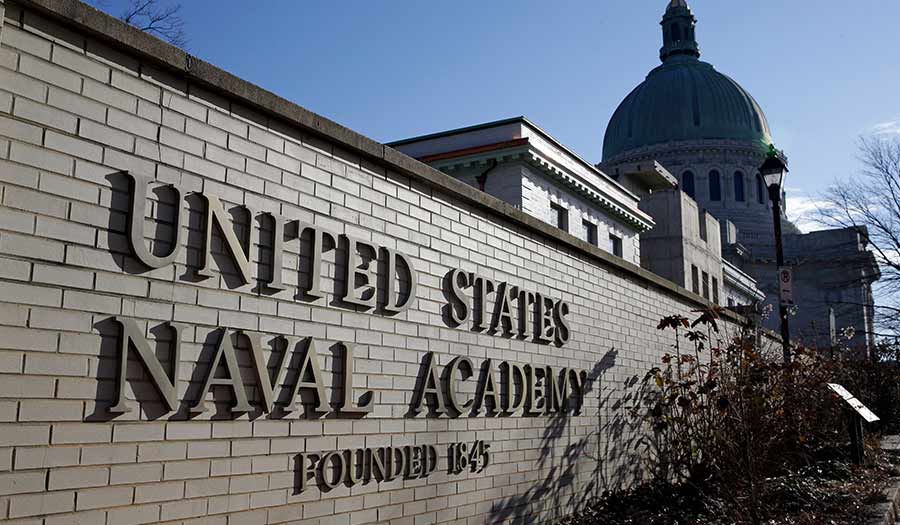 AP/Patrick Semansky
AP/Patrick Semansky
World News Desk
Learn the why behind the headlines.
Subscribe to the Real Truth for FREE news and analysis.
Subscribe NowWASHINGTON (AP) – Reported sexual assaults at U.S. military academies shot up during the 2021-22 school year, and one in five female students told an anonymous survey that they had experienced unwanted sexual contact, the Pentagon said Friday. The survey results were the highest since the Defense Department began collecting that data.
Defense and military leaders said student-reported assaults at the Army, Navy and Air Force academies jumped 18 percent overall compared with the previous year. Calling the increase “extremely disappointing and upsetting,” defense officials said teams are visiting all three academies this month to try and target improvements and changes to address the problem.
The increase was driven largely by the Navy, which had nearly double the number of reported assaults in 2022, compared with 2021. It’s unclear whether the phasing out of COVID-19-related restrictions contributed to the increase, including at the U.S. Naval Academy, which is directly adjacent to bars in downtown Annapolis, Maryland.
“The results are, simply put, extremely disappointing,” said Vice Adm. Sean Buck, superintendent of the Naval Academy. “The current situation is unacceptable and we must improve our culture.”
A student survey accompanying the report found increases in all types of unwanted sexual contact—from touching to rape—at all the schools. And it cites alcohol as a key factor. The report was released Friday.
The military services and the academies have struggled for years to combat sexual assault and harassment, with myriad prevention, education and treatment programs. But despite reams of research and expanded programs, the numbers continue to grow. Young Army soldiers last month dismissed videos and training as outdated and told service leaders that small group discussions would be more effective.
The increases have triggered outrage on Capitol Hill and a steady stream of legislation. But as of yet, the changes have not appeared to make a dent in the problem, although officials argue that expanded assistance programs have encouraged more victims to report the crimes.
According to U.S. officials, 155 students reported assaults during the 2022 school year, compared with 131 the previous year. Of those, students at the U.S. Naval Academy reported 61—nearly double the school’s total for the previous year, when there were 33, which was by far the lowest of all the academies for that year.
Cadets at the Air Force Academy in Colorado reported 52, the same as the previous year, and those at the U.S. Military Academy at West Point in New York reported 42, a slight decrease from last year’s 46.
Not all the assaults in the report happened while the students were enrolled in the academies. Because students are encouraged to report assaults, they sometimes will come forward to talk about events that happened in the years before they started school there. As a result, 16 students reported an assault in the 2021-22 school year that occurred prior to joining the military.
As well, 35 cases involved civilians, active-duty service members and prep school students who allegedly were assaulted by someone who was a student. Altogether, the total number of reported assaults with any connection to a student was 206—about 28% higher than last year’s total of 161.
The COVID-19 pandemic led to a brief dip in cases at the academies during the shortened 2019-20 school year, when in-person classes were canceled, and students were sent home in the spring to finish the semester online.
At the start of the 2020-21 school year, students faced a number of restrictions due to the ongoing pandemic. But as those slowly scaled back and bars and restaurants reopened, the numbers began to increase again. Officials said it’s hard to tell what, if any, impact COVID-19 had on the 2021 school year results.
The Pentagon puts out two reports every year on the number of sexual assaults reported by military academy students and by U.S. service members. But because sexual assault is such an underreported crime, the department also conducts anonymous surveys every two years to get a clearer picture of the problem among both the students and the active-duty population. Pentagon leaders believe the survey provides a more accurate depiction of the assaults and the contributing factors.
Based on the surveys, students at the academies are less likely to report an assault than service members who are out of school. Students may worry more about the impact on their military career or even on the career of their attacker.
According to the latest survey of academy students, 21.4 percent of women said they experienced unwanted sexual contact in the 2022 school year, compared with about 16 percent in 2018, the last year the survey was done, due to COVID-19 restrictions. For men, the rate went from 2.6 percent in 2018 to 4.4 percent in 2022.
Based on the survey, attacks against women were most often by a male who was usually in the same class year, and more than half the time knew them from school or other activities. Attacks on men were more often—55% of the time—by a female who was in the same class year and knew them.
Alcohol use was involved in well more than half of the cases reported in the survey, with a high of 65 percent at the Naval Academy. The report recommends additional alcohol use policies.
The report also found that sophomores and junior men were most at risk. And women are still far more likely to actually report an assault than men.
Pentagon leaders have for years pushed public campaigns urging students to report any attacks, and they argue that an increase in assault reports suggests that students feel more comfortable coming forward to seek help.
According to the report, the rates of unwanted sexual contact reported in the survey are “at or above civilian rates” based on 2014 and 2018 statistics from the American Association of Universities. No other more recent statistics were available, so it is difficult to accurately compare the military academies with other non-military universities.
More on Related Topics:
- Thousands Survived a Brutal Gang Attack in Haiti that Killed 70. Now They Face an Uncertain Future
- Hunger in Haiti Reaches Famine Levels as Gangs Squeeze Life Out of the Capital and Beyond
- Railroads and Regulators Must Address the Dangers of Long Trains, Report Says
- 5 Things to Know About the Apparent Assassination Attempt on Donald Trump
- Cocaine Trade in the Rugged Micay Canyon Threatens Colombia’s Peace Efforts



